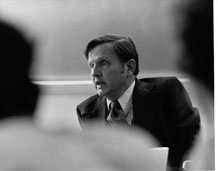Edward Bruce Mclean H’03
 Edward Bruce McLean, 82, died September 12 in Crawfordsville.
Edward Bruce McLean, 82, died September 12 in Crawfordsville.
Born May 13, 1929, in Chicago, IL, he was the son of Alexander and Ruth McLean.
He graduated from Columbus High School in 1947 and served in the U.S. Army between 1951 and 1953, attaining the rank of sergeant major.
He received a Ph.D. in political science from Indiana University in 1963.
He taught at the University of Florida and Florida Presbyterian (now Eckerd) College before accepting an appointment as an associate professor of political science at Wabash in 1968, where he taught until his retirement in June 2003. He was promoted to full professor at Wabash in 1971 and served as chairman of the department of political science until 1980.
He received the McClain McTurnan Award for Excellence in Teaching in 1975, and in 1981 he was awarded the Eugene N. and Marian C. Beesley Chair in Political Science.
While at Wabash he wrote two books, edited four others, and published a number of articles dealing with political and legal theory.
In 2008, he was made an honorary alumnus of Wabash College, Class of 2003.
He began the study of law at night at Indiana University in Indianapolis in 1970, receiving his J.D. cum laude in 1975. Following his admission to the bar, McLean served as a part-time deputy prosecutor in Montgomery County for 19 years. He was named a Sagamore of the Wabash in 1980; an Honorary Secretary of State of Indiana in 1982; and was co-chairman of Scholars for Reagan during President Reagan’s first campaign.
He served on the Indiana Civil Rights Commission for two years.
In 2003 he was awarded the David W. Peck Medal by Wabash for eminence in the law.
McLean met Pierre Goodrich in 1979 when Goodrich asked him to research the legal theory of Roscoe Pound. This research resulted in Law and Civilization: The Legal Thought of Roscoe Pound (University Press of America, 1992). In 1987, McLean was elected to the board of directors of Liberty Fund, a private, educational foundation established by Mr. Goodrich to encourage the study of the ideal of a society of free and responsible individuals.
McLean served on the board of directors until his death. He was an active member of St. Bernard’s Catholic Church in Crawfordsville.
He is survived by his wife, Maria McLean; son, Ian McLean; and a granddaughter.
A Remembrance
It was a crisp fall afternoon in 1983. The course was Political Science—Constitutionalism. In the midst of a spirited discussion of Friedrich von Hayek’s book The Mirage of Social Justice, I broke one of Dr. McLean’s cardinal rules: I spoke without thinking first. And then I heard something a McLean student never wanted to hear: total silence, followed by these words from Dr. McLean: “Now Mr. Himsel, surely you don’t mean to suggest that…” Through a series of skillful
questions delivered rapidly (once more earning his nickname “Fast Eddy”), Dr. McLean helped me understand and, ultimately, correct my mistake.
Although it was an uncomfortable moment for me in some respects, I have never forgotten Dr. McLean’s lesson. Neither has any other McLean student, all of whom had this kind of experience at some point. We remember his lessons not just because Dr. McLean was a remarkably smart and gifted teacher. We also remember his lessons because Dr. McLean was very polite and professional when he dealt with students. Dr. McLean never lost sight of the fact that his students were much younger and far less experienced than he was. At the same time, he never failed to push us—and push us hard—to achieve our highest potential.
In all of these ways, Dr. McLean modeled critical thinking and humane living for generations of Wabash students and future lawyers. Although he often focused on the law, he had a wide range of interests that he freely shared with students, including political philosophy, religion, and music.
He also stuck out (quite a bit) from the rest of the faculty by being a conservative Republican and a libertarian.
Perhaps his most memorable trait was his deep and abiding love of liberty. He believed strongly in the capacity of free and responsible individuals to govern themselves with a minimum of government interference. And he applied his distinctive Socratic method to all students so that he helped conservatives to become better conservatives and liberals to become better liberals.
He taught all of us to think and to speak more effectively and to live more humanely. There is no better or more fitting gift a Wabash professor could give his students.
—Scott Himsel ’85, Visiting Assistant Professor of Political Science